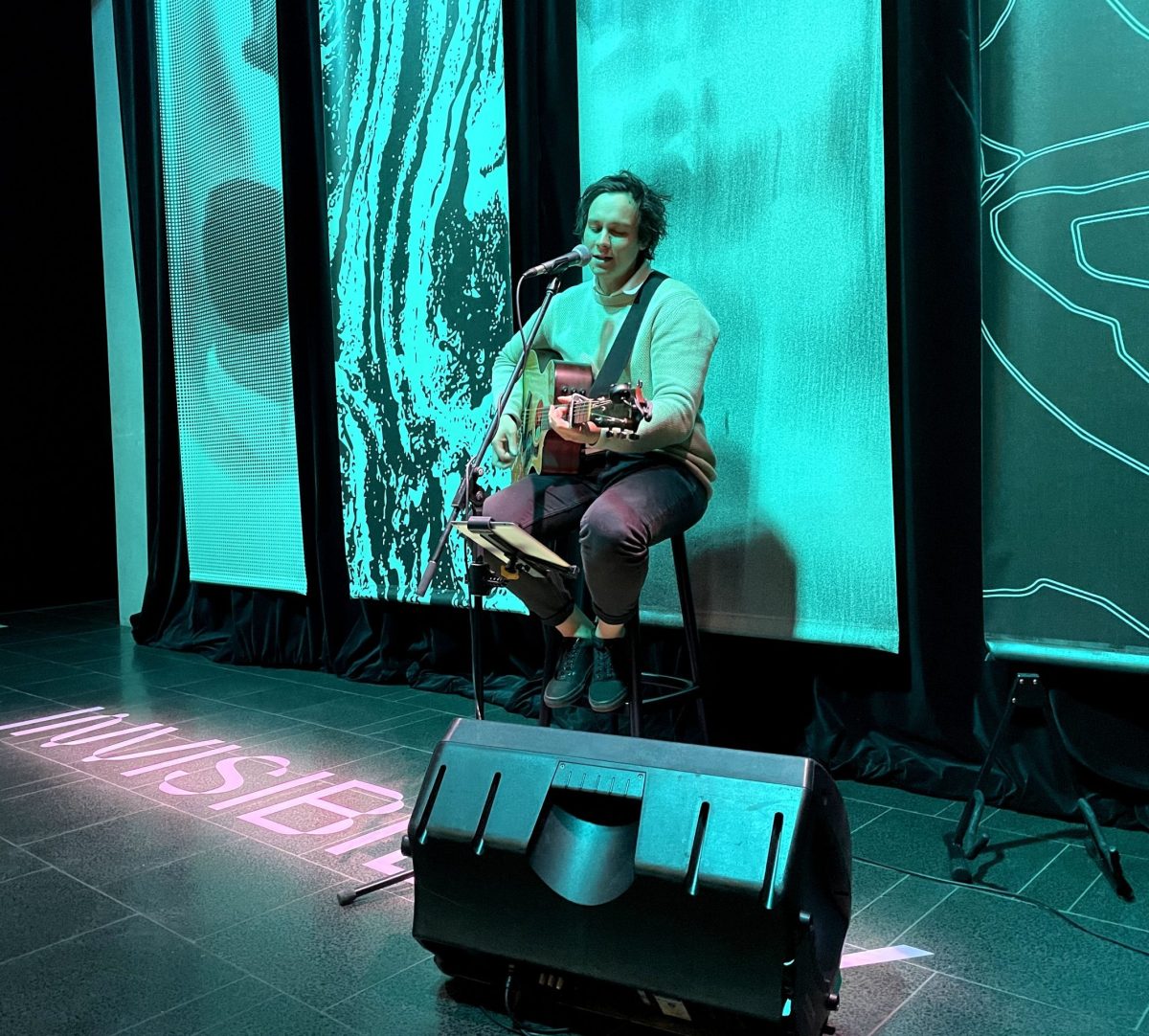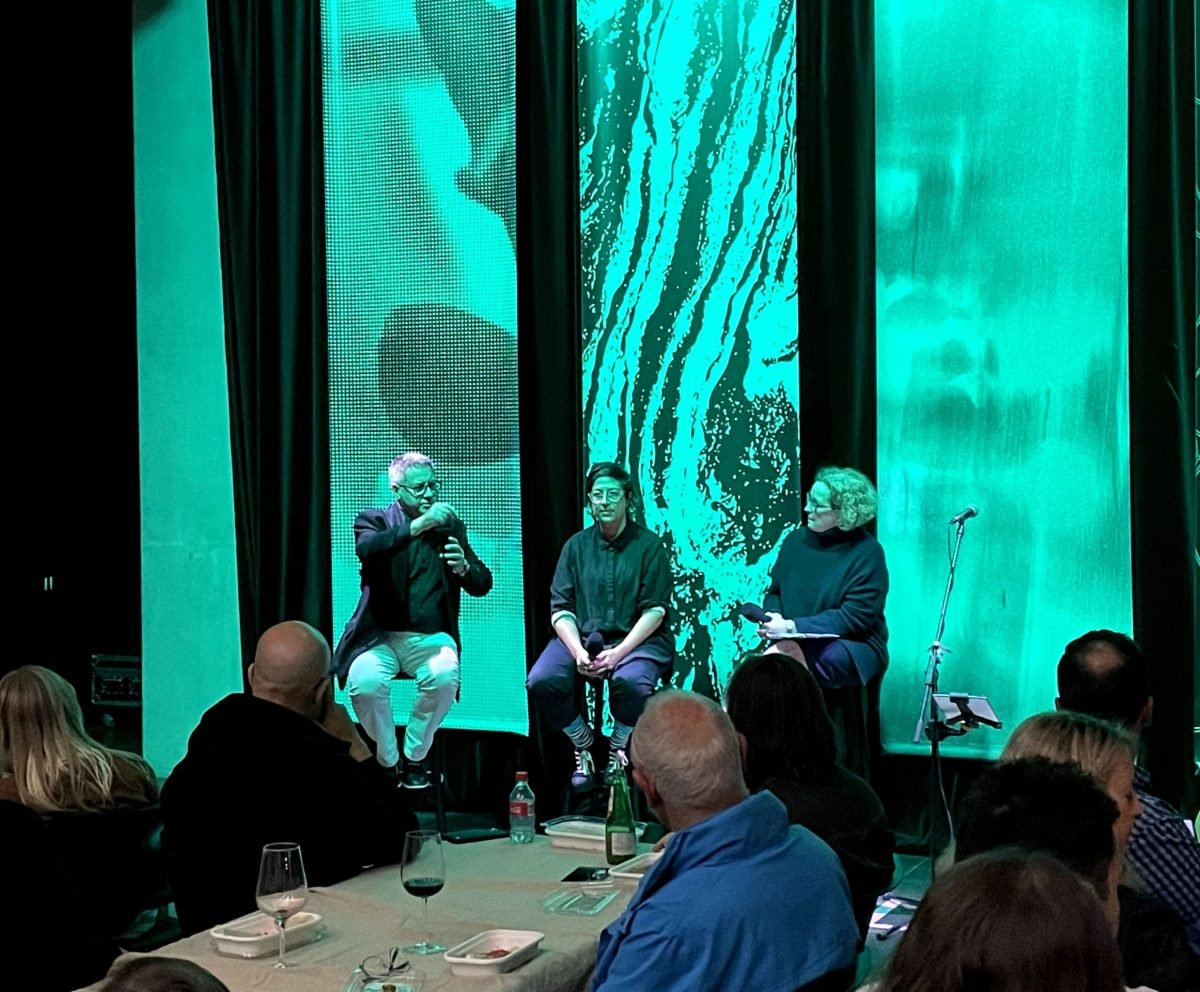Posted 31 May

Ethos: the ethics of audio and video streaming
MOD. hosted its second Ethos Community of Practice for 2022 in May. This endeavour looks at the ethics of technology and research – in this case the ethics of streaming. It aims to foster a culture of ethical questioning amongst researchers and the public.
This forum examined the ethics of audio and video streaming as a starting point to explore future-focused ethical questions around fair remuneration for content creators and how algorithms affect participants of streaming platforms. The evening began with a live performance by artist Jordan D’Sena, including his recent singles ‘Secrets’ and ‘Silhouette’.
A discussion between Jordan, Dr Kristin Alford, Dr Kim Munro, and Professor Allan O’Connor then provided ethical provocations. Afterwards, we considered how these ethical questions give insight into how streaming algorithms shape our preferences, communities, and the stories we hear.

Allan noted that streaming services have dynamically changed the music media industry. It used to follow a linear, sequential production cycle where creators produced content, copies were manufactured and then sold. However, streaming or “platform businesses don’t… actually produce anything”. Instead, their value is from “curating… connections between makers (artists) and consumers (us)”.
This platform structure allows Spotify to dominate the music media market with – as Jordan said – “400 million users a month”. Consequently, they have significant bargaining power over artists, who generally only receive $0.004 per play on the platform. Jordan noted this has changed the focus from having shows and “selling CDs” to promoting your music through TikTok and submitting songs to “curated Spotify playlists” to get their play numbers up. One participant mentioned an artist who found an innovative ‘hack’ to the Spotify streaming system. He recorded over 60,000 low quality songs, which allowed him to receive reasonable remuneration through the sheer quantity of his music on the platform.
Additionally, Jordan successfully had his single “Secrets” added to the Woolworths Radio rotation. Consequently, he received additional exposure but no remuneration. This again illustrated the issue of whether these exchanges result in shortchanging artists. Alternatively, one participant noted that while big streaming platforms may be useful for artists to gain exposure, other platforms may provide a fairer remuneration deal. She pays an annual subscription to access music and other content from her favourite artist on Patreon. Accordingly, the artist receives a recurring, reliable income stream from their most ardent fans.
Participants discussed what role streaming algorithms play in catering to – and the shaping of – their preferences. One participant felt the Netflix algorithm was too narrow and targeted. It bombarded them with content from a certain genre, simply because they watched one show. Another participant noted that if we just accept the algorithm’s curated recommendations, it could incrementally narrow and shape “what we like and who we are”. For example, another contributor said that she switches to her partner’s Netflix account to get out of the rom-com niche and broaden what she sees.
This led to a discussion on how comfortable people are with the invasive and opaque nature of the algorithm. Kristin noted that it is a “black box” and we don’t really know how it works. For instance, one participant remarked that it felt “creepy” and “intrusive” how this unknown entity knew them and gave them suggestions.

Kim noted that “a big part of… Australian documentaries is around impact” and involves community-based screenings, festivals, and outreach. This means that there aren’t many documentaries going straight to Netflix or other streaming platforms. She posed that the pleasurable and comfortable nature of streaming may present a challenge to people getting together and having impactful conversations about ideas behind documentaries.
Kristin observed the more we watch content suggested by algorithms, “the more that type of content gets commissioned”. How do we ensure that we facilitate the creation of new and local stories? Kim noted that streamers don’t currently fall under local content quotas in Australia (except for Channel 9-owned Stan). Participants discussed implementing a government policy that requires 20% of streaming revenue in Australia to be reinvested into Australian content. However, one of the difficulties with quotas is defining what constitutes local content. For example, Canada introduced a local content quota, but this just resulted in American content made in Canada. Ensuring that genuine Australian stories are funded, seen, and heard is a complex challenge.
The Ethos Community of Practice is made possible with funding through the Deputy Vice-Chancellor of Research and Enterprise. The previous Ethos forum investigated the ethics of organic food. We hold Ethos events regularly at MOD. Check out our events page for more details!
Samuel Wearne was the rapporteur for this forum and is a moderator at MOD.